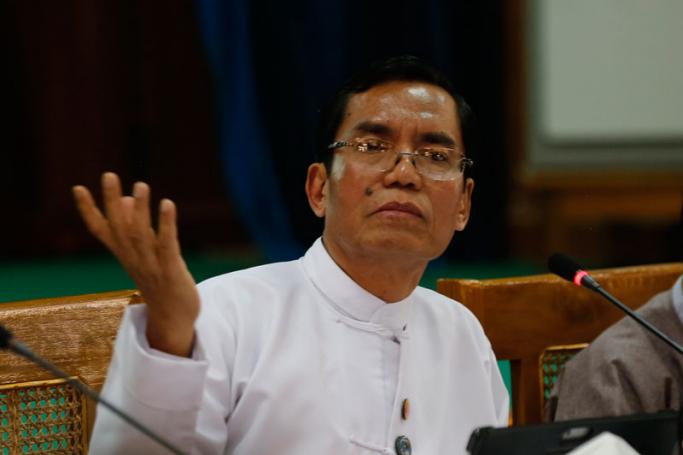H.E U Aung Hla Tun, Deputy Minister of Ministry of Information held a press conference on the situation in Rakhine state yesterday in Nay Pyi Taw, the following is his opening remarks.
“The main purpose of this press conference is to keep the international community posted on our preparedness for the systematic repatriation of those who had fled to Bangladesh.
We have been completely ready to go ahead with the repatriation for some time but we still have not been able to receive anyone. Why? My colleagues will give the details in their presentation.
Before that, I would like to draw your attention to the major causes of the mass exodus.
According to the information from the reliable sources on the ground, most of these people fled in panic just after the military operation following the terrorist attacks, for fear of being arrested for their involvement or on suspicion.
The second reason was threats by ARSA and its supporters. We heard many people were threatened to flee.
The third reason was many of them were persuaded to flee by the expectations such as chances of resettlement in a third country or better livelihood at the camps in Bangladesh.
Ladies and gentlemen, now I would like to give you some salient points in the bilateral agreement on the repatriation.
As you all know, Myanmar Union Minister U Kyaw Tint Swe and Bangladesh Foreign Minister AH Mahmood Ali signed an agreement in Nay Pyi Taw on November 23, 2017 on repatriation of the displaced residents.
The basic conditions of this deal were the same as the content of the agreement signed between the two countries in 1993.
Another important term in the agreement is ‘those who can produce proof of residency in Myanmar will be repatriated’.
So far as I understand, ‘proof of residency’ is very liberal. It can be citizenship identity cards, national registration cards, temporary registration cards, business ownership documents, school attendance certificate as well as the name of the village, etc.
The repatriation was to start within two months after the signing - that is before January 23, 2018.
With the intention of fulfilling our commitment, our government made all-out efforts to make every necessary preparation in time.
Preparations became ready in time. Myanmar, also as a goodwill gesture, sent over a list of some 1,200 verified persons, over 700 Hindu and 500 Muslim so that they can be sent back immediately.
In the middle of February, Bangladesh government sent back over 8,000 forms to us. However, the forms were lacking essential information and all important requirements for biometric verifications.
For example, they did not contain fingerprints nor visible
identification marks of the family head and clear photos of the would-be returnees.
To our shocking surprise, on March 7 some international media reported a senior member of Bangladesh cabinet as giving his pessimistic view on our efforts for repatriation.
Nobody should be allowed to politicize this repatriation process.
We are doing our best to make this process a success and we sincerely hope Bangladesh government will reciprocate in the same manner.
On the other hand, I would like to urge the international media to give enough balanced coverage of our activities and situation.
Unsubstantiated reports by some influential international media have caused a lot of serious misunderstanding of our country among the international community.
Finally, I have the pleasure to inform you some important development concerning the northern Rakhine State.
We are discussing with UNHCR and UNDP for their involvement in assisting the government in the repatriation process.
At the same time, we have been planning guided trips for the media - every two weeks at present. Since we have limited resources, facilities and serious security concerns, we have to restrict the number of the participants and the areas of the trip.
Security has to be taken into serious consideration since ARSA had trained many people in improvising handmade landmines. I hope you will understand our position and difficulty.
For your information, the next trip will be for the international media and it is scheduled to start on March 16 - 18.
Before I conclude my statement, I would like to take this opportunity to call upon the international community and the media to help us in making this repatriation process successful.”
You are viewing the old site.
Please update your bookmark to https://eng.mizzima.com.
Mizzima Weekly Magazine Issue...
14 December 2023
New UK Burma sanctions welcome...
13 December 2023
Spring Revolution Daily News f...
13 December 2023
Spring Revolution Daily News f...
12 December 2023
Spring Revolution Daily News f...
11 December 2023
Spring Revolution Daily News f...
08 December 2023
Spring Revolution Daily News f...
07 December 2023
Diaspora journalists increasin...
07 December 2023
Tatmadaw and Arakan Army are in talks












